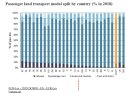Interesting how you totally avoid the question and pick up one point to carry on your argument. You aren't a politician by any chance? Saying there are many options without articulating any of them - and how they would be superior - isn't great debate.
Borrowing would be OK if it created some growth, but borrowing to maintain roads will at best ensure productivity doesn't fall. Austerity - I'm not sure we have the appetite for more. There may be strong voices arguing that the public should pay for everything (medical care, education etc) but I believe there is enough support for quality state provision that this isn't realistic. Austerity also isn't aligned with the increased public transport provision necessary to reduce car use. Indeed, I can see car use keeping on increasing without a wide-ranging (and expensive) plan to improve provision of park and rides, tram and metro networks, and improved long distance rail links.
You make the point further down about taxing food to replace tobacco duty, but fail to recognise the massive reduction in healthcare costs smoking prevention brings. There are similar arguments for reducing car dependence, even if we move to cleaner EVs, there are still particulate emissions from brakes and tyres, and the sedentary lifestyle of car use isn't great for long term health either.

